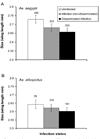Size alters susceptibility of vectors to dengue virus infection and dissemination
- PMID: 18981505
- PMCID: PMC2630770
Size alters susceptibility of vectors to dengue virus infection and dissemination
Abstract
The size of arthropod vectors may affect their ability to transmit pathogens. Here we test the hypothesis that body size alters the susceptibility of Aedes aegypti and Aedes albopictus mosquitoes to dengue virus (DENV) infection and subsequent dissemination throughout the body of the mosquito. After feeding on blood containing known quantities of virus, smaller-sized females were significantly more likely to become infected and to disseminate virus than larger individuals. The effects of size were stronger for Ae. aegypti and independent of rearing conditions. Ae. albopictus was more susceptible to DENV infection and had higher virus titer in the body than Ae. aegypti, yet infected Ae. aegypti disseminated DENV more readily than infected Ae. albopictus. These results are consistent with the concept that Ae. aegypti is a more competent vector of DENV and emphasize the importance of body size in determining adult infection parameters.
Figures


References
-
- O’Meara GF, Evans LF, Jr, Gettman AD, Cuda JP. Spread of Aedes albopictus and decline of Ae. aegypti (Diptera: Culicidae) in Florida. J Med Entomol. 1995;32:554–562. - PubMed
-
- Werner EE, Gilliam JF. The ontogenetic niche and species interactions in size-structured populations. Ann Rev Ecol Systematics. 1984;15:393–425.
-
- Osenberg CW, Mittelbach GG, Wainwright PC. Two-stage life histories in fish: the interactions between juvenile competition and adult performance. Ecology. 1992;73:255–267.
Publication types
MeSH terms
Substances
Grants and funding
LinkOut - more resources
Full Text Sources
Medical
